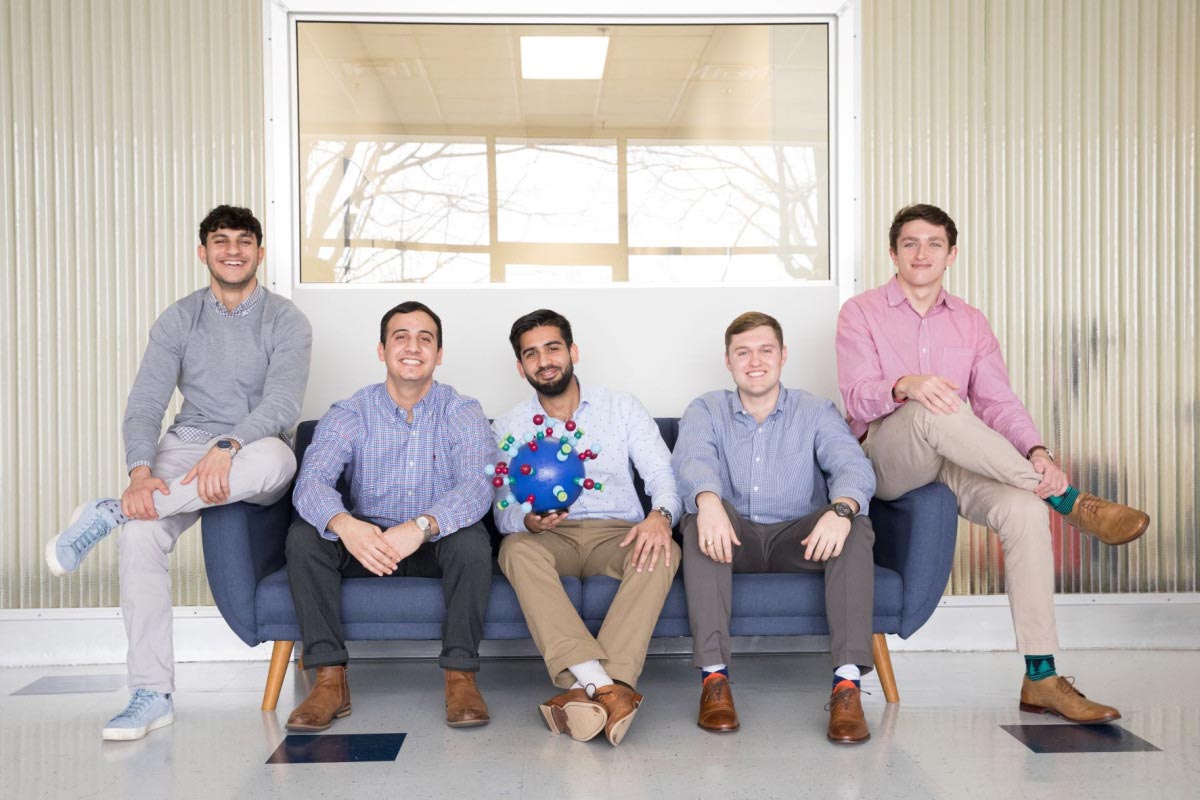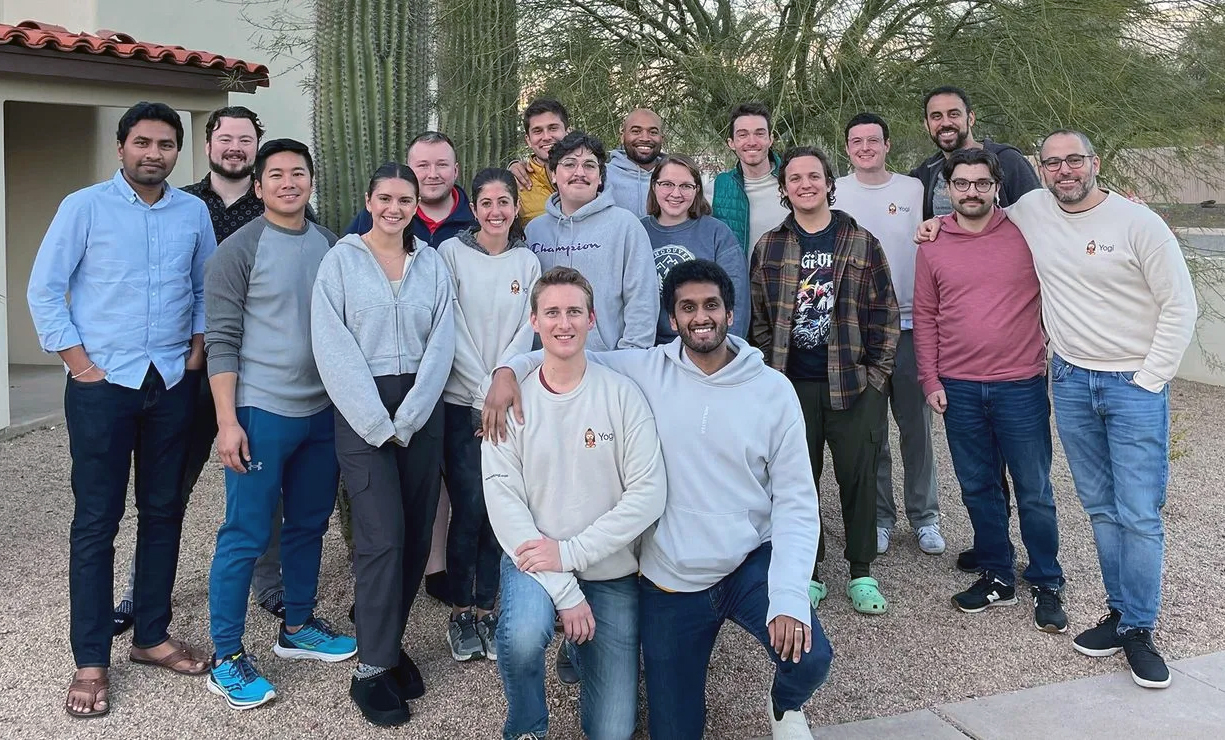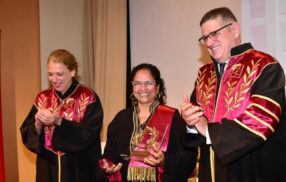
i.Lab Incubator Startups: Where Are They Now?
By Caroline Newman
Each summer, a group of competitively selected entrepreneurs converges on the i.Lab Incubator at the University of Virginia Darden School of Business for two months of intensive workshops, mentorship and collaboration.
Their paths often diverge wildly across the country, around the world and into many different industries. But no matter how far they go, innovation continues to characterize iLab alumni and the businesses they lead.
As the i.Lab marks its thirteenth summer, we checked in with a few alumni to see how their businesses have progressed since participating in the summer incubator.
AgroSpheres: Pest Control Without the Harmful Pesticides

From left, AgroSpheres team members Sepehr Zomorodi, Payam Pourtaheri, Ameer Shakeel, Zach Davis and Joseph Frank. (Contributed photo)
Payam Pourtaheri and Ameer Shakeel are co-founders of AgroSpheres. They started their journey with the i.Lab when they were still students at UVA in 2016. Pourtaheri had just finished his undergraduate engineering degree and Shakeel was entering his fourth year.
Under the mentorship of the late Mark Kester, who had appointments in the School of Medicine Department of Pharmacology, Biomedical Engineering and Ophthalmology and was an expert in nanotechnology, Pourtaheri and Shakeel developed a spray that could be used on pesticide-treated plants to remove potentially harmful residue.
The duo took the product into the i.Lab in 2016 when they founded AgroSpheres. In the seven years since then, Pourtaheri, Shakeel and their growing team – now up to 25 employees – have continued to do what they do best: detailed, thorough research and product development.
“Our commitment to true research and development sets us apart; we get really excited about third-party, validated data,” Pourtaheri said. “We are really committed to developing a product, contracting with a university or outside researchers to test that product, and making sure that the data we get is reproducible.”
As AgroSpheres grew, the team broadened its focus, looking not just at breaking down pesticides but also at creating better pest control – non-toxic biological pesticides that use RNA interference, or RNAi, to genetically target specific pests.
“We can specifically target some of the harmful pests in a way that is completely non-toxic to bees, pollinators and other insects and animals,” Pourtaheri said.
The technology is so promising that AgroSpheres recently announced plans to build a new fermentation plant near their company headquarters in Charlottesville, using $25 million in funding the company raised in a recent investment round. Virginia Gov. Glenn Youngkin attended the launch, lauding the co-founders for the innovation and investment they have brought to the commonwealth.
For Pourtaheri, investing in Charlottesville’s startup community has been one of the most rewarding parts of the journey that started in the iLab nearly a decade ago.
“We have been able to attract talent from all over the country,” he said, noting that many of the company’s employees are immigrants, similar to the two co-founders. “Ameer and I are both naturalized citizens, so it is really exciting for us to help families strengthen their roots in the U.S. and in Charlottesville.”
He is on the board of the Cville Biohub, which aims to build a “compassionate biotech community” in the town, Pourtaheri said.
If AgroSpheres’ latest products are successful, that success could spread from Virginia around the world.
“If we are successful in achieving in what we are trying to do, we can actually make a positive impact globally,” he said. “That is very motivating to our entire team.”
JAS: Cocktails That Bring the Fun, Without the Alcohol

JAS, founded by Cecilia Rios Murrieta (MBA ’22), offers alcohol-free cocktails from Los Angeles that are available wholesale to restaurants, bars and retailers, as well as online (Contributed photo).
Cecilia Rios Murrieta, the recipient of a Batten Scholarship in Entrepreneurship at the Darden School, started JAS Alcohol-Free Cocktails during her first year at the Darden School of Business, about two years after she quit drinking.
“That was a very deliberate decision that I made, as I was preparing for my MBA and just did not feel that drinking contributed anything positive to my life,” she said. Still, she wanted to be social and found herself looking for delicious, creative, alcohol-free drinks – an often fruitless search.
“Being a nondrinker in those settings was kind of hard, there were just not a lot of options,” she said. “I wanted something that still felt fun and creative, like a great cocktail.”
Rios Murrieta, who had owned and operated a liquor company in Mexico before business school, turned her attention to non-alcoholic cocktails and built JAS, which offers products like the Paloma Libré, an alcohol-free version of the classic grapefruit-lime cocktail.
By the time she entered the i.Lab, just after graduating from Darden in 2022, Rios Murrieta fleshed out her idea in several entrepreneurship-focused classes. By the end of that summer, JAS launched its first production run.
One year later, Rios Murrieta has now launched the product in Los Angeles, distributing wholesale to restaurants, bars and retailers, as well as direct-to-consumer sales online. Rios Murrieta has focused particularly closely on marketing, favoring in-person interactions with in-store tastings, trade store visits and other events over online marketing.
So far, she said, the response has been positive.
“We have a more than 50% reorder rate with retailers,” she said. “On average, we have seen more than 20% growth month-to-month.”
The JAS team has also grown, and the company is looking to complete a round of seed funding this year after being entirely self-funded to this point.
Looking back one year after her i.Lab experience, Rios Murrieta said her i.Lab summer helped her to maintain momentum after business school and gave her the resources and feedback she needed to launch. And, she got to enjoy a full-circle moment this year as JAS was served at Darden’s alumni reunion events.
“I just love seeing people drink it in real life,” she said. “They were really excited about the flavors; it’s something they don’t expect and there was sense of relief and excitement to have a nonalcoholic option.”
Yogi: AI-Powered Consumer Insights

Front row (left to right) UVA School of Engineering and Applied Sciences alumni Chad Becker and Gautam Kanumuru, co-founders of Yogi, pose with their team (Contributed photo).
Yogi, a company co-founded by two UVA Engineering graduates who completed the i.Lab in 2018, is finding innovative ways to use artificial intelligence and natural language processing.
The company’s software platform uses AI to aggregate data directly from consumer reviews and analyze that data for brands, delivering rapid insights that might have taken months to distill from focus groups or surveys.
“With advancements in deep learning that really started in 2018, we have been able to unlock unstructured data and text data, new data sources that were really untapped,” said co-founder Chad Becker, who started the company with fellow Hoo Gautam Kanumuru. Rather than wasting time reading random reviews online or waiting on old-fashioned surveys, companies can rely on Yogi’s AI.
“Yogi can analyze millions of reviews using an AI that has a human-level understanding of text,” Becker explained. “It is similar in concept to ChatGPT, which really brought this technology into the popular mind recently.”
When Becker and Kanumuru were in the i.Lab, they were in the process of developing the technology Yogi uses today, but they had a different use case.
“At the time, we were building an investment literacy app to educate people on investing and provide insights,” Becker recalled. “We ended up pivoting, but the core technology that we have today was developed in the i.Lab.”
The pivot, Becker said, came as the company completed another accelerator, the competitively-selected New York City-based Entrepreneurs Roundtable Accelerator, and the world entered the COVID-19 pandemic. Yogi leaders noticed the bump in online shopping, facilitated by stay-at-home orders, and began to wonder what their AI platform could do with the millions of consumer reviews proliferating online.
Turns out, major brands were interested too. Today, Yogi provides tailored, AI-driven insights to brands including Microsoft, Tylenol, Nestle, Tropicana, Colgate, Purina, IAMS and more.
“I think we were able to solve a problem that has been around for a while, and that brands have struggled with,” Becker said. “We are really on the frontier, with the underlying technology, and among those building AI models that the world had not previously seen.”
The University of Virginia Darden School of Business prepares responsible global leaders through unparalleled transformational learning experiences. Darden’s graduate degree programs (MBA, MSBA and Ph.D.) and Executive Education & Lifelong Learning programs offered by the Darden School Foundation set the stage for a lifetime of career advancement and impact. Darden’s top-ranked faculty, renowned for teaching excellence, inspires and shapes modern business leadership worldwide through research, thought leadership and business publishing. Darden has Grounds in Charlottesville, Virginia, and the Washington, D.C., area and a global community that includes 18,000 alumni in 90 countries. Darden was established in 1955 at the University of Virginia, a top public university founded by Thomas Jefferson in 1819 in Charlottesville, Virginia.
Press Contact
Molly Mitchell
Associate Director of Content Marketing and Social Media
Darden School of Business
University of Virginia
MitchellM@darden.virginia.edu




